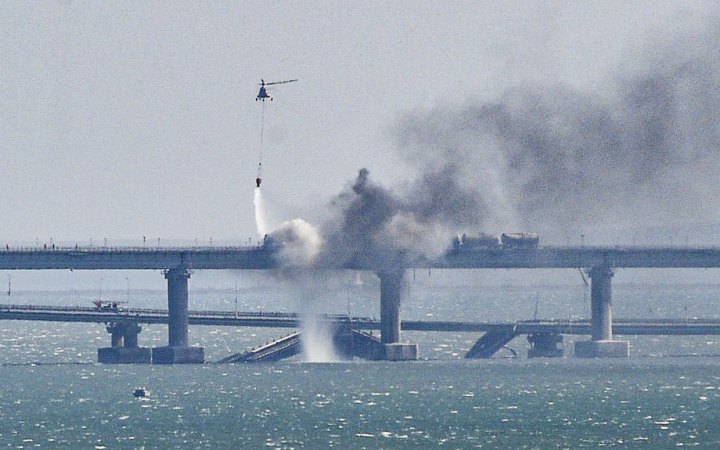According to communications intercepted by Ukraine’s security services, Russian and Chinese business executives with government ties have held secret discussions on plans to build an underwater tunnel connecting Russia to Crimea in hopes of establishing a transportation route that would be protected from attacks by Ukraine, The Washington Post reports.
The talks, which included meetings in late October, were triggered by mounting Russian concerns over the security of an 11-mile bridge across the Kerch Strait that has served as a key logistics line for the Russian military but has been bombed twice by Ukraine and remains a vulnerable war target.
The newspaper notes that the negotiations underscore Russia’s determination to maintain its grip on Crimea, a peninsula that it annexed illegally in 2014, as well as Moscow’s growing dependence on China as a source of global support.
Constructing a tunnel near the existing bridge would face enormous obstacles, according to U.S. officials and engineering experts who said work of such magnitude, probably costing billions of dollars and taking years to complete, has never been attempted in a war zone.
The project would also pose political and financial risks for China, which has never officially recognized Russia’s annexation of Crimea, and whose companies could become ensnared in economic sanctions that the United States and the European Union have imposed on Moscow.
Nevertheless, intercepted emails indicate that one of China’s largest construction companies has signaled its willingness to participate. The messages were provided to The Washington Post by Ukrainian officials hoping to expose the project and China’s potential involvement. The authenticity of the messages was corroborated by other information separately obtained by The Post, including corporate registration files showing that a Russian-Chinese consortium involving individuals named in the emails was recently formed in Crimea.
One of the emails, dated 4 October, describes the Chinese Railway Construction Corporation, CRCC, as “ready to ensure the construction of railway and road construction projects of any complexity in the Crimean region.”
CRCC, a state-owned company, built many of the largest road and rail networks in China and has established substantial ties to Russia in recent years through projects including an extension of the Moscow subway system that was completed in 2021. The company did not respond to requests for comment.
A senior executive at the Russian-Chinese Consortium, based in the Crimean city of Sevastopol, refused to answer questions about the tunnel project when reached by a Post reporter.
Vladimir Kalyuzhnyy, a Russian businessman who is identified in documents as the general director of the consortium, dismissed the matter as “a lot of hot air” before declaring that he would not provide any information to the “enemy media” and abruptly ending the call.
His response was at odds with how the proposal has been depicted in internal emails. In a message sent last month to a Russian official who serves as one of Crimea’s main representatives in Moscow, Kalyuzhnyy said he had “a letter from our Chinese partners about the readiness of one of the largest companies in China, CRCC, to participate as a general contractor in the construction of a tunnel under the Kerch Strait.”
The email was addressed to Georgiy Muradov, who is listed as the permanent representative of the Republic of Crimea to Russian President Vladimir Putin. Muradov, who previously served as Russia’s ambassador to Cyprus, did not respond to requests for comment.
The emails also reveal Chinese efforts to maintain secrecy. One emphasizes that CRCC will participate only under a “strict provision of complete confidentiality” and that the company’s name will be replaced by “another, unaffiliated legal entity” on any contracts.
Another email mentions a Chinese bank willing to “convert its dollar funds into rubles for their transfer to Crimea to fund [consortium] projects.”
The emails cite consortium discussions with a CRCC executive identified as Xu Huaxiang, a name that appears to match that of a Chinese national who is listed as a vice president and deputy general manager of the international arm of the company. Attempts to reach Huaxiang were not successful.
Given the risks of sanctions and sabotage, U.S. officials and experts expressed surprise that CRCC would risk involvement.
Experts on major international transportation projects said that constructing a tunnel beneath the Kerch Strait is technically feasible and that China has the necessary expertise and equipment. Still, they said, it would be a huge undertaking, comparable in scale to a tunnel between Denmark and Germany that has been under construction for eight years, is projected to cost more than $8.7 billion, and would be the longest tunnel in Europe when it is completed near the end of the decade.
Experts said that it is unlikely that a Kerch tunnel could be completed in time to aid Russia in its war effort, but that Moscow may see it as a longer-term investment — one meant to provide a secure link to territory that could be contested for decades.
For its part, China would probably insist on at least partial ownership of the tunnel, adding to its expanding inventory of global port and transportation infrastructure. China could also finance the project and extract payment either in tolls or from Russian oil and gas exports.
Subterranean work could proceed at minimal risk, engineering experts said, but the project would still put thousands of employees, costly pieces of equipment and sprawling construction sites within reach of Ukrainian missiles.
Because of the threat of attack, experts said, Russia and China would probably not be able to use newer construction methods involving giant dredging vessels on the water’s surface. Instead, they would have little choice but to use traditional tunnel-boring technology.








